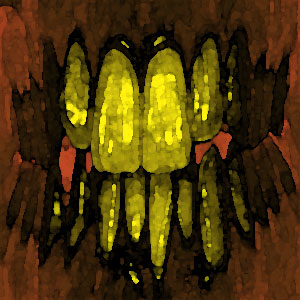You did it! First thoughts that come to mind about SLQ Issue 16?
Ta da! It’s been a great experience working with the SmokeLong staff and SLQ 16 is a slamming collection that goes from the heartbreaking to the zany.
We were lucky to get you while Night Train was on hiatus. What challenges and surprises did you encounter doing this flash-only gig? Any differences in editing an online journal versus a print one?
The main difference is in the length of the work. It’s much quicker to go through submissions and I love it! And no, there isn’t much difference between online and print when it comes to searching for work that excites you.
What draws you to the flash form? What excites you about the submissions you received? What disappointed you about the “slush pile?”
Doing this editorial gig has boosted my appreciation for flash. I’ve always been about immediate gratification and flash gives it like that. If a short story is a dish to linger over, flash is like popping a scrumptious chocolate in your mouth. And writing it is an intense challenge, to see how much you can wring from the fewest number of words. Everything gets amplified in flash.
The main disappointment of the slush pile is too much same-old, same-old. Lots of familiar themes without adding anything new.
As you read over the stories in this issue, any common threads? Any thing that screams out, “Alicia Gifford guest edited this issue?”
Look for me snorting in the dark and sordid corners…
Titles. How important is a title? What do you feel is important to getting a flash piece to work?
A great example of how a title can cinch a piece of work is in this very issue! Issue 16! Mike Amato’s flash, “Heaven by the Highwayside.” You read it, it’s great, fresh, zany; and then you look at the title again, and it KILLS. It’s great when a title works so well with the body of a flash piece, but it’s not mandatory.
As to getting a flash piece to work, the way I see it, it’s got to call up something outside of itself that pings the reader in some way. It has to have some kind of a point. It has to be well written, well told and some kind of fresh.
Rusty Barnes (Night Train) and Dave Clapper (SLQ). Who would win in a one-on-one poker match? Arm-wrestling? Bike race? Trivial Pursuit?
Ha ha hahahahaha. My money’s on Obama.
Chess. Just how good are you?
Sometimes I play well; mostly I suck. It’s a way of escaping that doesn’t involve chemicals. I rationalize the time I waste on Yahoo games by telling myself it’s good mental exercise. It’s a great game though, and when you’re on a roll, I bet it’s better than crack. I’d have to try crack though, to be sure, and that would most likely be disaster.
What’s up with your own writing?
Story-to-story. That’s what does it for me.
At the recent AWP conference, a number of writers talked about their old flames, books that have influenced them during a formative time in their lives—and ones they return to for lessons in writing and, of course, life. Discuss your old flame, both what it meant to you then and what it means to you now.
As kids, my sister and I were voracious readers and my mother supplied us with lots of good stuff. I should remember this. She’s 85 now, and cranky, but I digress.
Books that I loved were the usual things: Little Women (oh how I loved that book!) Jane Eyre, Tom Sawyer, Oliver Twist, Little House on the Prairie, The Good Earth, Peyton Place (ha ha, stolen from my MOTHER). Catcher in the Rye, of course, and I imitated Holden’s voice to write letters to boys. It worked.
As a seedy adult I also read my share of Jackie Collins, Harold Robbins, Patricia Cornwall and James Patterson. Etc. And dug them.
I didn’t start writing until later in life, and since then, I read differently. My first writing teacher (Tod Goldberg) assigned Lorrie Moore’s “You’re Ugly, Too” and I had an aha! moment with it. I know it’s cheesy but it changed my life. Lorrie Moore, Amy Hempel, Alice Munro, Raymond Carver, Richard Yates, Tobias Wolfe—these are some of the people I return to again and again for inspiration and learning.
And may I say how jump-up-and-down thrilled I am to have Tod’s story “This Is What You Left Behind” in this issue? It’s like a mystic, karmic crop circle or something.


 The core workshop of SmokeLong Fitness is all in writing, so you can take part from anywhere at anytime. We are excited about creating a supportive, consistent and structured environment for flash writers to work on their craft in a community. We are thrilled and proud to say that our workshop participants have won, placed, or been listed in every major flash competition. Community works.
The core workshop of SmokeLong Fitness is all in writing, so you can take part from anywhere at anytime. We are excited about creating a supportive, consistent and structured environment for flash writers to work on their craft in a community. We are thrilled and proud to say that our workshop participants have won, placed, or been listed in every major flash competition. Community works.